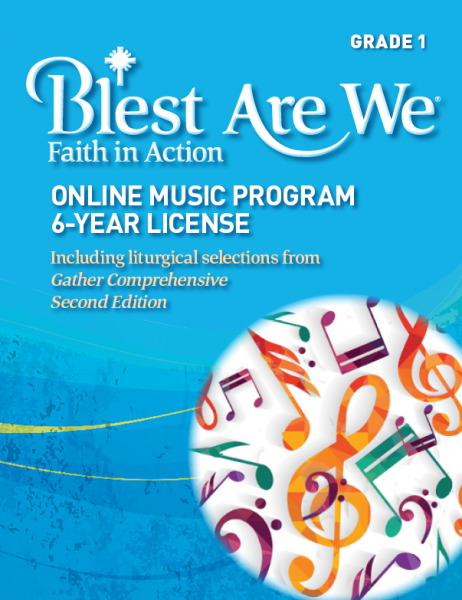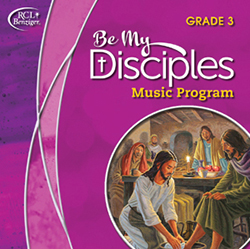Question of the Week, August 15, 2020, The Assumption of the Blessed Virgin Mary, Year A
Over the past forty years, I’ve had the opportunity to travel the country to lead retreats, workshops, and parish missions. Because the Church and the world are ever-changing, ever-growing, and ever-evolving—and because I am (hopefully!) too—I never give the same presentation twice.  What I learn, what I read, what I experience, and the insights that come in prayer and silence are always bringing new understandings that I love to share and explore with others.
What I learn, what I read, what I experience, and the insights that come in prayer and silence are always bringing new understandings that I love to share and explore with others.
But one retreat plan has remained a constant over the last several years. I call it “The Spirituality of Joy.” The plan came together as the result of reading James Martin’s Between Heaven and Mirth, and from the comments of two coworkers. One said to me, “It is so good to see someone who really enjoys her work.” The other prayed, “Lord, thank you for Mary, who brings such joy to our workplace.” The book and the comments made me pause and think about joy, or the lack thereof, in the lives of those around me.
We’ve come through some difficult and challenging months as individuals and as a country. But today, Mary’s words of rejoicing in the beautiful Magnificat (see Luke 1:46-55) remind us that God still reigns and that we still have many reasons to rejoice.
In the spirit of the Magnificat, take some time today to follow a suggestion made by James Martin in Between Heaven and Mirth. Identify your sources of joy, past and present—individuals, experiences, opportunities for growth, religious things, small everyday blessings, things you take for granted, and things that make you laugh.
What might you need to rekindle in order to join Mary in full-heartedly proclaiming, “My spirit rejoices in God my Savior”?
Mary Sellars Malloy has over forty years’ experience as a Catholic educator and lay minister. She is a frequent workshop presenter on the topics of prayer, liturgy, spirituality, the Sacraments, and the RCIA. In addition, Mary leads retreats and parish missions throughout the country. Her goal is to encourage Catholics of all ages to appreciate and to live their Catholic faith.Product Recommendation
Our Family Devotions
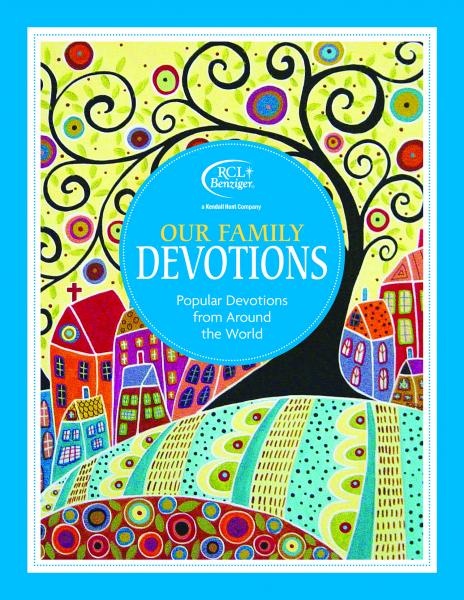 This book celebrates the many ways people of different cultures express the Catholic faith in their churches, neighborhoods, and homes. As the Good News of Jesus spread around the world, people in every culture found special ways to express their faith in God. Through the ritual words and gestures of popular devotions, Catholics show their love for God and devotion to Mary and the saints.
This book celebrates the many ways people of different cultures express the Catholic faith in their churches, neighborhoods, and homes. As the Good News of Jesus spread around the world, people in every culture found special ways to express their faith in God. Through the ritual words and gestures of popular devotions, Catholics show their love for God and devotion to Mary and the saints.
Some popular devotions begin with a message that is given to a person and then shared with others. Many traditions grow from the blending of the Catholic faith with a cultural celebration. Although the prayers and rituals may be adapted to meet the spiritual needs of a culture, all popular devotions are intended to help people recognize God’s love for them and grow in their love for God.
It is our prayer that through this book your family will experience God in new ways in your everyday lives. May the diverse and rich traditions of families and the Church from around the world lead you to find new ways of living out your faith. May the beauty of these devotions remind us that we are one family in Jesus Christ, sharing God’s love in our homes, churches, and communities.
Question of the Week, August 9, 2020, Nineteenth Sunday in Ordinary Time, Year A
Several years ago, a coworker gave me a lovely South American pottery piece. It is a small boat carrying Jesus and the disciples. I treasure the gift to this day, and when I look at it, I think, “We’re in this boat together.”
 We’re in this boat together—Jesus, you, me, family members, friends, coworkers, sinners, saints—we cry, we laugh, we sing, we pray, we question, we rise, we fall, we move forward, together.
We’re in this boat together—Jesus, you, me, family members, friends, coworkers, sinners, saints—we cry, we laugh, we sing, we pray, we question, we rise, we fall, we move forward, together.
Being in this boat together, facing storms and trials and challenges together, gives us courage and strength to keep going. It is the kind of strength I find in the Communion of Saints, the procession of holy ones—past, present, and future--who surround me on the road to the kingdom and just don’t let me fall. Their words and examples remind me to fix my gaze on Christ and to keep walking in faith. It is much easier to do so when I am walking with others.
Over the past several months, we’ve often heard and seen the slogan, “We’re all in this together.” Now, as we enter back into familiar activities and social gatherings, and as we respond to new challenges and opportunities to create a more just and inclusive society, will we take these words to heart? Will we bring the Good News of Jesus into the conversation and into the rebuilding of relationships and communities? Let us draw our strength to try from the words Jesus says to us today, “Take courage, . . . do not be afraid” (Matthew 14:27).
Mary Sellars Malloy has over forty years’ experience as a Catholic educator and lay minister. She is a frequent workshop presenter on the topics of prayer, liturgy, spirituality, the Sacraments, and the RCIA. In addition, Mary leads retreats and parish missions throughout the country. Her goal is to encourage Catholics of all ages to appreciate and to live their Catholic faith.Product Recommendation
Our Family Devotions
 This book celebrates the many ways people of different cultures express the Catholic faith in their churches, neighborhoods, and homes. As the Good News of Jesus spread around the world, people in every culture found special ways to express their faith in God. Through the ritual words and gestures of popular devotions, Catholics show their love for God and devotion to Mary and the saints.
This book celebrates the many ways people of different cultures express the Catholic faith in their churches, neighborhoods, and homes. As the Good News of Jesus spread around the world, people in every culture found special ways to express their faith in God. Through the ritual words and gestures of popular devotions, Catholics show their love for God and devotion to Mary and the saints.
Some popular devotions begin with a message that is given to a person and then shared with others. Many traditions grow from the blending of the Catholic faith with a cultural celebration. Although the prayers and rituals may be adapted to meet the spiritual needs of a culture, all popular devotions are intended to help people recognize God’s love for them and grow in their love for God.
It is our prayer that through this book your family will experience God in new ways in your everyday lives. May the diverse and rich traditions of families and the Church from around the world lead you to find new ways of living out your faith. May the beauty of these devotions remind us that we are one family in Jesus Christ, sharing God’s love in our homes, churches, and communities.
Is there anything better than a baby’s belly laugh?
Passionate and perfect, no matter the pitch; able to bring joy to any heart and, inevitably, echoed back by those who hear it.
I like to think God laughs that way. Certainly God has a sense of humor. Just look at the ostrich, or the blue-footed booby bird, the sloth, or my favorite, the penguin.
 I believe wholeheartedly that God intended us to laugh, and to experience laughter as a brief respite from trying times, a mini port in a storm, a breathless retreat, especially when we laugh with another person.
I believe wholeheartedly that God intended us to laugh, and to experience laughter as a brief respite from trying times, a mini port in a storm, a breathless retreat, especially when we laugh with another person.
One of my favorite memories of laughing happened the night four of my friends and I sang with the Greek Symphony Orchestra. To say it was a little out of our comfort zone is putting it mildly, but after a month of rehearsal, learning enough Greek to sing the songs, and maintaining our composure when the lights went out during the production, we headed out in tuxedos and gowns to a local bar/restaurant to celebrate and breathe a sigh of relief that we had made it through.
We looked and felt very much out of place in this very relaxed environment and were pleasantly surprised at being treated like special guests. Actually, it was my first, and only, experience of what I imagine it would be like to be treated like a star. It came with a tiny price tag, though—having to maintain the sophisticated image.
As we sat at our table with our wine glasses full, perusing the menu, one of my friends leaned forward and whispered, “Mary, what is ‘rag out’?”
Perplexed, I asked him to show it to me on the menu. When I saw the item I burst out laughing and could barely speak. I can only blame the hilarity on stress relief.
When I was able to compose myself, I explained, “It’s ragout, not rag out. Ragout is a kind of stew.”
By now we were all hysterical, imagining how quickly the curtain of our sophistication would have been pulled back if my friend had actually ordered the “rag out.”
It would understandably seem trivial to someone outside our little group of friends, but we still laugh about it years later. It was also one of the first memories to came to mind upon the recent passing of one of my dear friends who was part of that memorable evening.
Laughter leaves a powerful imprint.
Look back at those times when you laughed the longest, the hardest, with the most pleasure. Where were you? Who were you with?
During these challenging times, it’s important for children to laugh, too. It’s healthy, especially in the midst of experiences that can leave them anxious and fearful.
We might not think of saints as bastions of wit, but many are exceedingly good examples of the virtue of good humor.
Two who come to mind are Saint Teresa of Jesus and Saint Philip Neri.
Saint Teresa of Jesus, who earned the title Doctor of the Church, asked the question, “What would happen if we hid what little sense of humor we had?” and exclaimed, “From silly devotions and sour-faced saints, good Lord, deliver us!”
Saint Philip Neri would agree. He said, “A cheerful and glad spirit attains to perfection much more readily than a melancholy spirit.”
Archbishop Alfonso Capecelatro, who wrote a biography of Saint Philip Neri, said of him, “There was one feature in his character that never fails to fascinate the young: he was always mirthful and humorous.”
And let us not forget the message of the angel announcing Jesus’ birth: “I bring you tidings of great joy.”
Joy and laughter are fundamental to our faith. Let’s weave them into our lives whenever possible and make some wonderful memories.
Mary Regina Morrell is a Catholic journalist, author, and syndicated columnist who has served the dioceses of Metuchen and Trenton, New Jersey, and RENEW International in the areas of catechesis and communication.by Mary Sellars Malloy
Question of the Week, August 2, 2020, Seventeenth Sunday in Ordinary Time, Year A
What Church musician starts his or her new ministry during Holy Week? You guessed it. Me! There I was, on the Tuesday before Palm Sunday, meeting with the cantors and choir and trying to put together a plan for Palm Sunday and the Triduum. Somehow, by the grace of God, we made it—and not only did we make it, we truly celebrated and prayed together!
 I remember that ministry site. After the whirlwind Holy Week experience, I worked to settle into my small and dusty office, and by the time I weeded out old files, copies, and junk, I was left with one xerox box full of useful music. But onward I went, through the Easter Season and into Ordinary Time, when choir members offered to host a cheesecake sale to provide funding for new music. We raised $1100!
I remember that ministry site. After the whirlwind Holy Week experience, I worked to settle into my small and dusty office, and by the time I weeded out old files, copies, and junk, I was left with one xerox box full of useful music. But onward I went, through the Easter Season and into Ordinary Time, when choir members offered to host a cheesecake sale to provide funding for new music. We raised $1100!
From there, five college students, all music majors, stepped forward to add their voices, violin, percussion, clarinet, and exquisite piano playing to the mix. The next year, a parishioner who wished to remain anonymous sent word to me to choose and buy new hymnals for the parish and new accompaniment books for all of the instrumentalists.
Five loaves and two fishes? Impossible tasks? I understand! But I’ve seen with my own eyes that, when the work is God’s, when the timing is God’s, God provides all that is needed for the task and more.
What seems impossible to you today? Be that child who places the little you have into the hands of Jesus, and trust that you will have more than enough inspiration, courage, and wisdom to do what he is calling you to do.
Mary Sellars Malloy has over forty years’ experience as a Catholic educator and lay minister. She is a frequent workshop presenter on the topics of prayer, liturgy, spirituality, the Sacraments, and the RCIA. In addition, Mary leads retreats and parish missions throughout the country. Her goal is to encourage Catholics of all ages to appreciate and to live their Catholic faith.
Product Recommendation
Music Programs
|
Blest Are We |
Be My Disciples |
Sacramental Preparation |
|
Enliven your program with music using these resources which provide the program song and five unit songs for each level, special music related to chapter themes, instrumental tracks for meditation, and background music. |
Each music program contains:
|
These engaging music program, developed in partnership with Oregon Catholic Press, contain a variety of liturgical and catechetical songs for Eucharist and Reconciliation. A mixture of songs in Spanish and English and selected instrumental tracks are provided. |
When my children were young, and I would catch them doing something they shouldn’t be doing, they would always ask, “How did you know?”
“Moms know everything,” I would reply.
 When one of my sons went to college and was injured playing lacrosse, he had to go the hospital but never told me about his injury. He didn’t want to worry me. The next day I called him to ask him what happened and to find out how badly he was hurt.
When one of my sons went to college and was injured playing lacrosse, he had to go the hospital but never told me about his injury. He didn’t want to worry me. The next day I called him to ask him what happened and to find out how badly he was hurt.
There was a long pause on the end of the line before he said, ”How do you always know? It just happened yesterday.” I reminded him, “Moms know everything,” and if they don’t know, they inevitably find out.
It’s not something you can really explain, but I took advantage of the mystique while I could. He didn’t know for years that the hospital had called me for a bit of information because he put his home phone number on a form.
The truth of the matter is parents don’t know everything, and when our children are dealing with anxiety or fear or trauma, one of the most important things we can do as parents is admit that we don’t have all the answers.
During these past few months, and most likely for some time into the future, our children are going to have many questions about what is happening, why things are so different, are they in danger of getting sick or dying, and if things will ever go back to normal.
We can help them by giving them permission to ask the difficult questions and, when we don’t know an answer, offer to talk it over, throw out ideas, and be learners together.
The key to be able to do this is to first listen to our children. By listening we begin to develop the gift of wisdom given to us by the Holy Spirit. Wisdom will help us discern what is best for our children to hear from us and from the TV, based on their emotional states, their behaviors, and their unique needs.
Paramount to caring for children during times of anxiety is caring for ourselves. Our children know when we are stressed or fearful, even if we believe we are hiding it well. It is more helpful for them to share our strategies for self-care and to encourage them to find practices that will make them feel better as well. It’s the “children model what they see, not what they hear” principle.
And if that’s the case, then we can help children overcome fear when we model hopefulness. Life is going to throw a lot of difficult challenges at us, and at our children. We can help our children, and ourselves, to develop resiliency and diminish anxiety when we acknowledge the challenges but work to move forward with hope and a positive attitude.
Building hope is a family affair. It grows from communication—shared stories, shared fears, honesty, love, and prayer.
Hope, as it is spoken of in Scripture, is not something we simply have, it’s something we do. Hope accepts reality, no matter how difficult, but keeps us moving forward. Hope nurtures perseverance.
The Prophet Jeremiah was known as the “weeping prophet” because he was called to warn the people of the Kingdom of Judah of their impending destruction, but within that message was always a message of hope, which is always part of God’s plan.
Jeremiah reminds us of the Lord’s promise: “For I know well the plans I have in mind for you—oracle of the LORD--plans for your welfare and not for woe, so as to give you a future of hope" (Jeremiah 29:11).
Mary Regina Morrell is a Catholic journalist, author, and syndicated columnist who has served the dioceses of Metuchen and Trenton, New Jersey, and RENEW International in the areas of catechesis and communication.
Product Suggestion
Family Life
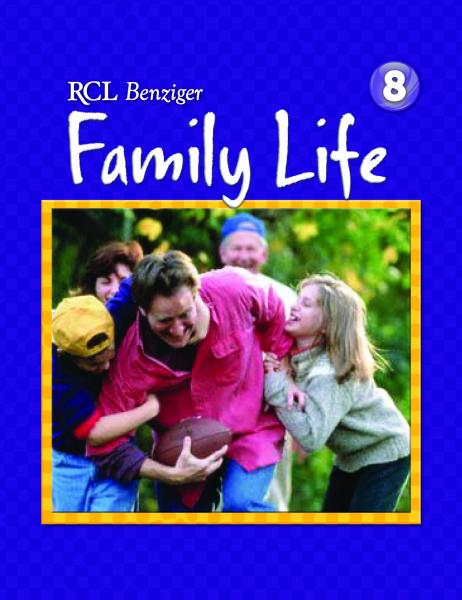 This comprehensive moral catechesis for families is available in print and online. Family Life is designed to complement the religion curriculum in your school or parish. It also integrates Child Safety Education into a holistic approach. This best-selling and most popular family program in the USA has been revised and strengthened to reinvigorate your partnership with parents. The latest revision presents the teachings of the Church with clarity and offers unparalleled support for Catholic families!
This comprehensive moral catechesis for families is available in print and online. Family Life is designed to complement the religion curriculum in your school or parish. It also integrates Child Safety Education into a holistic approach. This best-selling and most popular family program in the USA has been revised and strengthened to reinvigorate your partnership with parents. The latest revision presents the teachings of the Church with clarity and offers unparalleled support for Catholic families!
Key Features:
- A comprehensive curriculum that focuses on partnering with the parents
- Moral catechesis utilizing a virtues-based pedagogy with emphasis on Christian living
- Child safety education highlighting healthy relationships
- Adaptability for both schools and parishes to accommodate multiple learning environments
Online eAssessment Platform
RCL Benziger’s new eAssessment platform provides your Catholic school or parish with the ability to monitor, track, and report completion of the Child Safety Education Standards for our Family Life program. This resource enables you to measure comprehension based upon your parish, school, or diocesan guidelines and requirements, including the Mission and Catholic Identity and Academic Excellence standards.
Question of the Week, July 26, 2020, Seventeenth Sunday in Ordinary Time, Year A
My Grandma Hovey, a nurse by profession, often said, “If you have your health, you have everything.” Would you agree? After coming through a challenging spring-into-summer, I suspect that many of our definitions of what we truly need, of what is most important, have shifted. F or many of us, the forced shelter-in-place has been a call to return to what is essential: time together—playing, praying, talking, sharing meals; reconnecting with family members and friends; and finding new (and fun!) ways to celebrate graduations, birthdays, anniversaries, and life events.
or many of us, the forced shelter-in-place has been a call to return to what is essential: time together—playing, praying, talking, sharing meals; reconnecting with family members and friends; and finding new (and fun!) ways to celebrate graduations, birthdays, anniversaries, and life events.
For many, these have been challenging months: jobs lost, childcare unavailable, home as the classroom, and dreams for the future put on hold. We hope for a steady income and benefits, the resumption of school and parish life, and a return to face-to-face time with family members and friends.
Whatever our circumstances, today’s Gospel (Matthew 13:44-52) encourages us to keep our hearts always set on the true treasure: The Word of God revealed in Jesus Christ. In today’s Word we hear “Ask something of me and I will give it to you” (1 Kings 3:5), “We know that all things work for good for those who love God” (Romans 8:28), and “The kingdom of heaven is like a treasure buried in a field” (Matthew 13:44).
In the coming week, think about your own answer to today’s question. Choose one of the three Scripture verses and make it your prayer throughout the week. See what treasure the Lord has in store for you!
Mary Sellars Malloy has over forty years’ experience as a Catholic educator and lay minister. She is a frequent workshop presenter on the topics of prayer, liturgy, spirituality, the Sacraments, and the RCIA. In addition, Mary leads retreats and parish missions throughout the country. Her goal is to encourage Catholics of all ages to appreciate and to live their Catholic faith.Product Recommendation
Our Family Devotions
 This book celebrates the many ways people of different cultures express the Catholic faith in their churches, neighborhoods, and homes. As the Good News of Jesus spread around the world, people in every culture found special ways to express their faith in God. Through the ritual words and gestures of popular devotions, Catholics show their love for God and devotion to Mary and the saints.
This book celebrates the many ways people of different cultures express the Catholic faith in their churches, neighborhoods, and homes. As the Good News of Jesus spread around the world, people in every culture found special ways to express their faith in God. Through the ritual words and gestures of popular devotions, Catholics show their love for God and devotion to Mary and the saints.
Some popular devotions begin with a message that is given to a person and then shared with others. Many traditions grow from the blending of the Catholic faith with a cultural celebration. Although the prayers and rituals may be adapted to meet the spiritual needs of a culture, all popular devotions are intended to help people recognize God’s love for them and grow in their love for God.
It is our prayer that through this book your family will experience God in new ways in your everyday lives. May the diverse and rich traditions of families and the Church from around the world lead you to find new ways of living out your faith. May the beauty of these devotions remind us that we are one family in Jesus Christ, sharing God’s love in our homes, churches, and communities.
Question of the Week, July 19,2020, Sixteenth Sunday in Ordinary Time, Year A
Today’s Gospel (Matthew 13:24-43) gives us many glimpses: a man who sowed good seed in his field, a mustard seed—the smallest of all seeds—that a person sowed in a field, and yeast that a woman took and mixed with three measures of wheat flour. Jesus offers these examples in the form of parables, stories rich with symbols that ordinary folks like me can understand.
 Coming through months of uncertainty, anxiety, and fear, how would we answer the question today? What symbols would we use? I chuckle at the memory of going to the grocery and finding that the aisle with flour and yeast was totally empty—could it be that the kingdom of heaven is like a family baking together and sharing their bread with others? I recall being moved by the 7 PM ritual in New York City—the cheers, the clanging of pots, and even Broadway singers on their balconies. Could it be that the kingdom of heaven is like the encouragement that surrounded healthcare workers and first responders at the ends of their shifts? And who can forget the nationwide 3 PM playing of “Taps” this Memorial Day, in honor of fallen heroes and those who continue to serve our country? Is the kingdom of heaven like the twenty notes of that song, calling us to remember, and bringing us to tears?
Coming through months of uncertainty, anxiety, and fear, how would we answer the question today? What symbols would we use? I chuckle at the memory of going to the grocery and finding that the aisle with flour and yeast was totally empty—could it be that the kingdom of heaven is like a family baking together and sharing their bread with others? I recall being moved by the 7 PM ritual in New York City—the cheers, the clanging of pots, and even Broadway singers on their balconies. Could it be that the kingdom of heaven is like the encouragement that surrounded healthcare workers and first responders at the ends of their shifts? And who can forget the nationwide 3 PM playing of “Taps” this Memorial Day, in honor of fallen heroes and those who continue to serve our country? Is the kingdom of heaven like the twenty notes of that song, calling us to remember, and bringing us to tears?
The challenge of today’s Gospel is to not let the weeds of apathy, self-centeredness, and indifference overtake the signs and symbols of the kingdom of heaven we have seen in our midst. And the invitation to bake, to encourage, to remember, and to love.
Mary Sellars Malloy has over forty years’ experience as a Catholic educator and lay minister. She is a frequent workshop presenter on the topics of prayer, liturgy, spirituality, the Sacraments, and the RCIA. In addition, Mary leads retreats and parish missions throughout the country. Her goal is to encourage Catholics of all ages to appreciate and to live their Catholic faith.
Product Recommendation
Praying the Scriptures
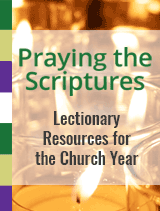 Catechists, religion teachers, and parents will find a wealth of resources designed to help them lead others in learning and reflecting on the Sunday Scriptures in the classroom and in the home. Classroom Sessions provide catechists and religion teachers with background on the Sunday readings as well as classroom session plans for primary, intermediate, and junior high students. Questions of the Week for adults and children, in English and in Spanish, are perfect for use in parish bulletins or school newsletters, and as faith-sharing discussion starters about the Sunday readings. A liturgical year calendar is also offered for ease of reference.
Catechists, religion teachers, and parents will find a wealth of resources designed to help them lead others in learning and reflecting on the Sunday Scriptures in the classroom and in the home. Classroom Sessions provide catechists and religion teachers with background on the Sunday readings as well as classroom session plans for primary, intermediate, and junior high students. Questions of the Week for adults and children, in English and in Spanish, are perfect for use in parish bulletins or school newsletters, and as faith-sharing discussion starters about the Sunday readings. A liturgical year calendar is also offered for ease of reference.
Question of the Week, July 12, 2020, Fifteenth Sunday in Ordinary Time, Year A
One of my favorite late-May rituals is cleaning out the flowerpots on my balcony and adding fresh soil before planting herbs and flowers. This means first pulling out any remaining dead roots or stray starts of weeds and plants so that each spring I have a fresh start to my humble garden.
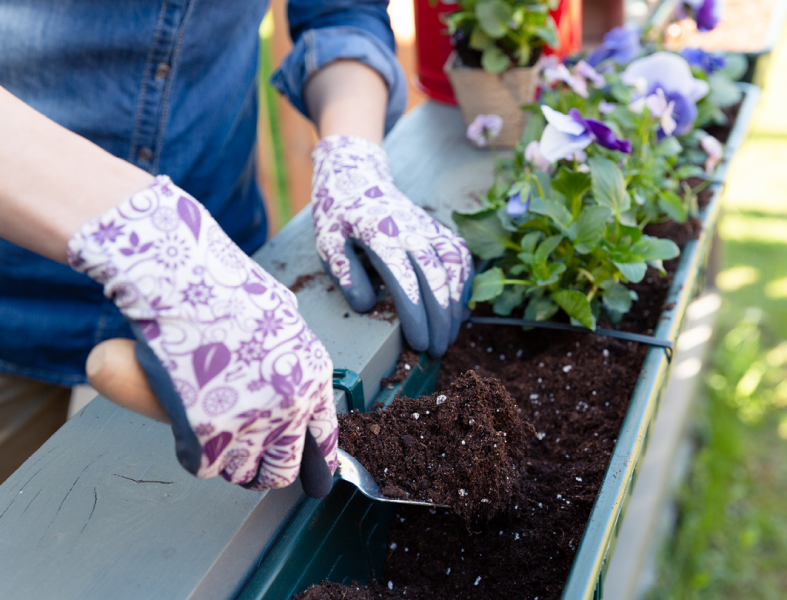 In today’s Gospel (Matthew 13: 1-23), we are reminded that providing good soil for the planting of the Word of God also means time first spent in preparation, removing rocks and stones, cutting away thorny branches, and adding fresh soil as needed.
In today’s Gospel (Matthew 13: 1-23), we are reminded that providing good soil for the planting of the Word of God also means time first spent in preparation, removing rocks and stones, cutting away thorny branches, and adding fresh soil as needed.
In his Angelus address from July 13, 2014, Pope Francis reminds us:
[W]e are the land where the Lord tirelessly throws the seed of His Word and His love. What is our disposition when we receive it? How is our heart? What does the ground look like: a path, a stone, a thorn bush? It’s up to us to become good soil without thorns or stones, but tilled and cultivated with care, so that it can bring forth good fruit for us and for [others]. At every Mass, the good seed of the Gospel is sown in us ever anew, by means of the table of the Word of God: a seed to be accepted, to safeguard, to live.
This week, think about the garden of your heart and soul. Is it ready to receive the Word of God, or are there still preparations to be made? Talk with Jesus about any thorns or stones that are in your way.
Mary Sellars Malloy has over forty years’ experience as a Catholic educator and lay minister. She is a frequent workshop presenter on the topics of prayer, liturgy, spirituality, the Sacraments, and the RCIA. In addition, Mary leads retreats and parish missions throughout the country. Her goal is to encourage Catholics of all ages to appreciate and to live their Catholic faith.Product Recommendation
Praying the Scriptures
 Catechists, religion teachers, and parents will find a wealth of resources designed to help them lead others in learning and reflecting on the Sunday Scriptures in the classroom and in the home. Classroom Sessions provide catechists and religion teachers with background on the Sunday readings as well as classroom session plans for primary, intermediate, and junior high students. Questions of the Week for adults and children, in English and in Spanish, are perfect for use in parish bulletins or school newsletters, and as faith-sharing discussion starters about the Sunday readings. A liturgical year calendar is also offered for ease of reference.
Catechists, religion teachers, and parents will find a wealth of resources designed to help them lead others in learning and reflecting on the Sunday Scriptures in the classroom and in the home. Classroom Sessions provide catechists and religion teachers with background on the Sunday readings as well as classroom session plans for primary, intermediate, and junior high students. Questions of the Week for adults and children, in English and in Spanish, are perfect for use in parish bulletins or school newsletters, and as faith-sharing discussion starters about the Sunday readings. A liturgical year calendar is also offered for ease of reference.
Question of the Week, July 5, 2020, Fourteenth Sunday in Ordinary Time, Year A
During recent shelter-in-place days, I took time to reread a favorite spiritual classic, Celebration of Discipline by Richard J. Foster. In suggesting practices for strengthening and enlivening the discipline of prayer and meditation, Foster proposes sitting quietly, resting our hands on our knees with palms upturned, and simply speaking with Jesus about anxieties, burdens, and things that are troubling our minds and hearts. “Jesus, here is what I bring to you in this moment, right now, today.”
 After the burdens of mind and heart and body have been expressed, Foster invites us to place our hands palms down on our knees and to intentionally thank Jesus for taking all that we have expressed into his own hands, into his own heart. In this way, we let go and place our burdens in Jesus’ care.
After the burdens of mind and heart and body have been expressed, Foster invites us to place our hands palms down on our knees and to intentionally thank Jesus for taking all that we have expressed into his own hands, into his own heart. In this way, we let go and place our burdens in Jesus’ care.
I have intentionally practiced this form of prayer since mid-March, when most of us were first ordered to shelter-in-place. Into Jesus’ hands, into Jesus’ care I have released physical and emotional tiredness, concern for my husband’s safety at work and the safety of his coworkers, concern for unemployed family members and friends, even sorrow as we celebrated the first Mother’s Day and Father’s Day since the deaths of my parents.
These short and simple pauses for prayer have indeed refreshed me and strengthened me in spirit. Won’t you, too, heed Christ’s invitation in today’s Gospel to find your rest—and your refreshment—in him?
Mary Sellars Malloy has over forty years’ experience as a Catholic educator and lay minister. She is a frequent workshop presenter on the topics of prayer, liturgy, spirituality, the Sacraments, and the RCIA. In addition, Mary leads retreats and parish missions throughout the country. Her goal is to encourage Catholics of all ages to appreciate and to live their Catholic faith.Product Recommendation
Catholic Prayers and Practices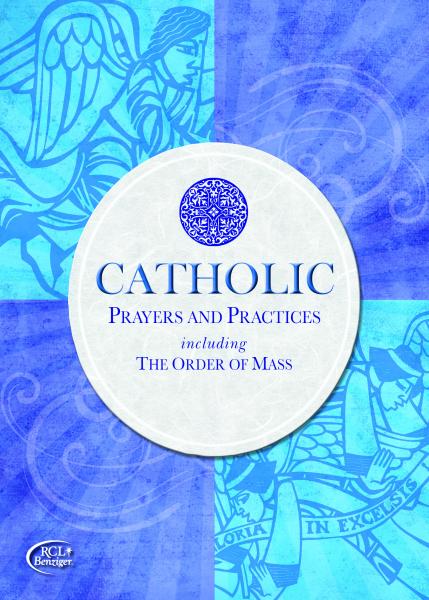
This small book, Catholic Prayers and Practices including The Order of Mass, contains traditional practices and prayers that unite us as Catholics. It is designed to support you in your faith life, and it can assist you in helping the younger members of our Church learn, grow and live as active members of the Catholic community.
This resource can be used for private, family or communal prayer. The Order of Mass section incorporates the language of the revised Roman Missal. Share the faith by giving copies of this book to others. In this way you are sharing in the ministry of our Lord, Jesus Christ, who called us to be his disciples and to share the Good News with all people.
When have you faltered or looked back during your journey of faith?
by Mary Sellars MalloyI almost always have a song in my mind and heart, and today I just can’t help but sing, “I have decided to follow Jesus. I have decided to follow Jesus. I have decided to follow Jesus. No turning back. No turning back.” (Source unknown)
Maybe we need to live a few years before we can understand the truth of that song, or maybe we need to come through a hard time or two. What I know, the more I walk the road of discipleship, is that Jesus’ call is to keep moving forward; to daily pick up the cross—whatever that may be in our lives—and to keep following him as he leads us forward to the heavenly kingdom.
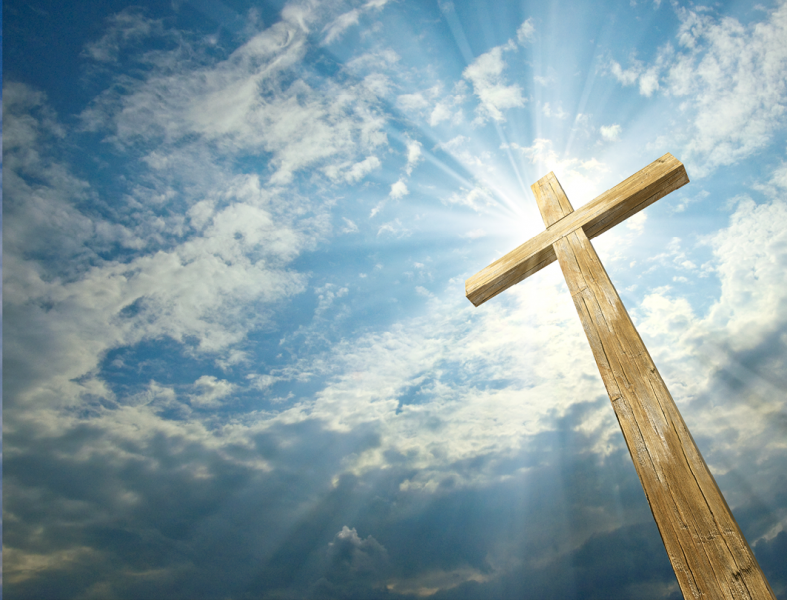 The second verse of the song, “The cross before me, the world behind me. The cross before me, the world behind me. The cross before me, the world behind me. No turning back. No turning back.”
The second verse of the song, “The cross before me, the world behind me. The cross before me, the world behind me. The cross before me, the world behind me. No turning back. No turning back.”
The world behind me—the poor choices I’ve made, the words I spoke in anger, the opportunities to serve that I ignored, the relationships I’ve bruised by my actions, the sins of my past—behind me as I look to the Cross of Christ and realize that his suffering and Death have freed me, and in his Resurrection is hope and confidence that one day I will live forever with him in Heaven.
If you find yourself faltering, doubting, and looking back today, spend a few minutes with Jesus. Put the world behind you by confessing your fears, doubts, and sins of the past to him. Better yet, if possible, celebrate the Sacrament of Reconciliation. Then face forward, and set your gaze on the one who says to us today, “Follow me.”
Mary Sellars Malloy has over forty years’ experience as a Catholic educator and lay minister. She is a frequent workshop presenter on the topics of prayer, liturgy, spirituality, the Sacraments, and the RCIA. In addition, Mary leads retreats and parish missions throughout the country. Her goal is to encourage Catholics of all ages to appreciate and to live their Catholic faith.
Product Suggestion
Reconciliation products
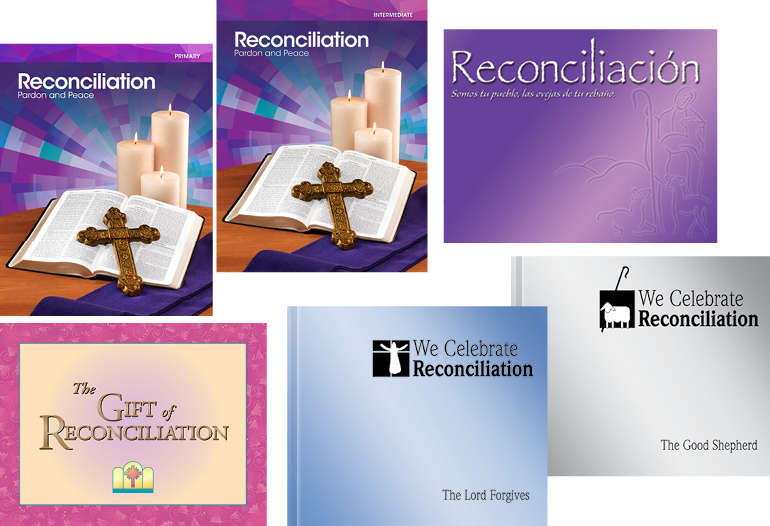 The foundations of each of our Sacrament preparation programs are Sacred Scripture, Church teaching, life experience, ritual, and prayer. Our materials focus on engaging children, youth, and their families in developing deeper relationships with Jesus Christ; in preparing children and youth to receive the Sacraments; and in helping families become more active participants in the life of the Church.
The foundations of each of our Sacrament preparation programs are Sacred Scripture, Church teaching, life experience, ritual, and prayer. Our materials focus on engaging children, youth, and their families in developing deeper relationships with Jesus Christ; in preparing children and youth to receive the Sacraments; and in helping families become more active participants in the life of the Church.
Pagination
Latest
Categories
Archives
- February 2015 (2)
- March 2015 (2)
- April 2015 (5)
- May 2015 (3)
- June 2015 (6)
- July 2015 (3)
- August 2015 (5)
- September 2015 (5)
- October 2015 (4)
- November 2015 (2)
- December 2015 (1)
- February 2016 (2)
- March 2016 (1)
- April 2016 (2)
- May 2016 (2)
- July 2016 (2)
- August 2016 (2)
- September 2016 (1)
- October 2016 (5)
- November 2016 (1)
- December 2016 (3)
- January 2017 (2)
- February 2017 (3)
- March 2017 (2)
- April 2017 (1)
- June 2017 (2)
- July 2017 (2)
- August 2017 (1)
- April 2018 (1)
- October 2018 (2)
- December 2018 (2)
- February 2019 (3)
- March 2019 (2)
- April 2019 (2)
- May 2019 (3)
- June 2019 (1)
- July 2019 (16)
- August 2019 (8)
- March 2020 (4)
- April 2020 (6)
- May 2020 (8)
- June 2020 (7)
- July 2020 (5)
- August 2020 (7)
- September 2020 (4)
- October 2020 (5)
- November 2020 (9)
- December 2020 (11)
- January 2021 (10)
- February 2021 (8)
- March 2021 (5)
- April 2021 (4)
- May 2021 (4)
- June 2021 (5)
- July 2021 (2)
- August 2021 (3)
- September 2021 (4)
- October 2021 (4)
- November 2021 (2)
- December 2021 (5)
- January 2022 (4)
- February 2022 (4)
- March 2022 (9)
- April 2022 (7)
- May 2022 (9)
- June 2022 (12)
- July 2022 (7)
- August 2022 (10)
- September 2022 (9)
- October 2022 (11)
- November 2022 (8)
- December 2022 (7)
- January 2023 (2)
- February 2023 (10)
- March 2023 (9)
- April 2023 (10)
- May 2023 (8)
- June 2023 (4)
- July 2023 (3)
- August 2023 (2)

